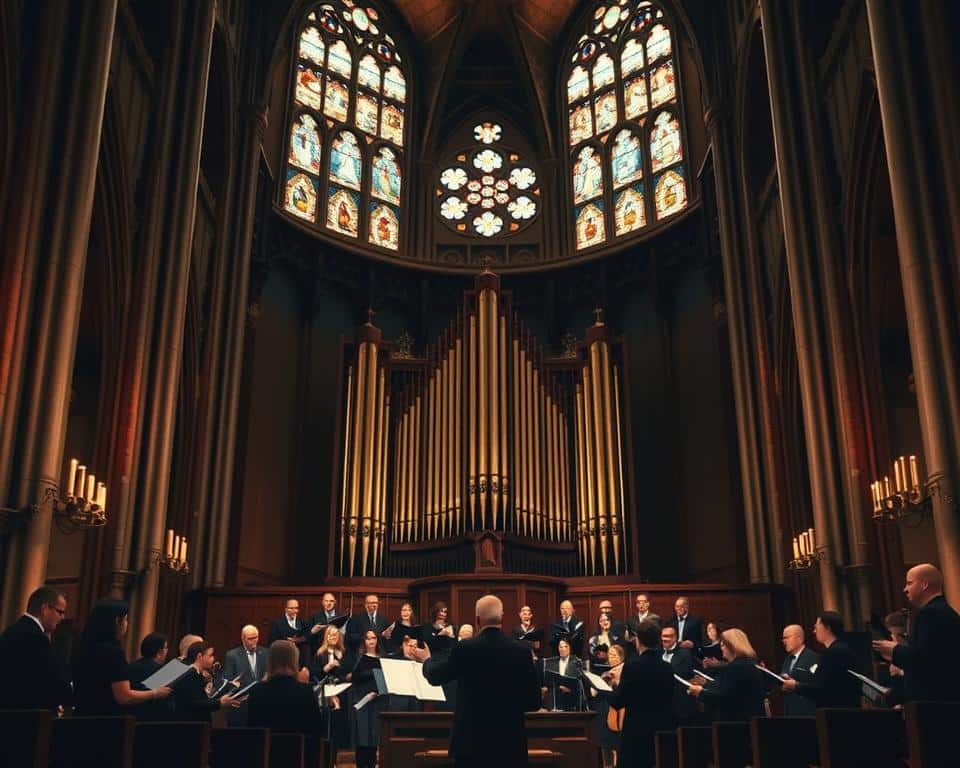“Music is the language of the soul.” – These words by Martin Luther capture the deep connection between faith and melody. From the earliest days of Scripture, believers have used songs to express gratitude, hope, and reverence for God.
The Bible overflows with examples of praise through melody. When Moses and Miriam led Israel in song after crossing the Red Sea (Exodus 15), they set a pattern still followed today. The Psalms—filled with joy, lament, and adoration—show how God designed music to uplift hearts.
In church gatherings, hymns and contemporary songs unite generations. They remind us of truth, focus our minds on Scripture, and create a shared experience. Whether simple or soaring, these melodies help believers connect with God’s presence. The importance of hymns in worship extends beyond mere tradition; they serve as a bridge connecting the past with the present. Through these cherished songs, congregants can express their faith and emotions, fostering a deeper communal bond. As voices harmonize, the shared act of singing becomes a powerful testimony of unity in belief and purpose.
This timeless practice isn’t just tradition—it’s a gift. As you explore how songs shape faith, you’ll see their power to inspire, teach, and bring people closer to Christ.
The Biblical Foundation of Worship Through Music
Scripture reveals God’s people have always expressed faith with song. These melodies weren’t just background noise—they were acts of remembrance, celebration, and surrender.
Moses and Miriam’s Song of Praise
After crossing the Red Sea, Moses led Israel in a triumphant declaration:
“I will sing to the Lord, for He has triumphed gloriously” (Exodus 15:1).

Miriam’s joy was contagious. She grabbed a tambourine, and the women followed her in dance. This wasn’t just celebration—it was communal gratitude. Their song set a pattern: when God acts, His people respond with melody.
Jesus Christ Sang Hymns with His Disciples
Centuries later, Jesus Christ honored this tradition. At the Last Supper, He and His disciples sang hymns—likely from the Psalms. Imagine the scene: the Savior, hours from the cross, lifting His voice in praise.
Today, churches worldwide sing during communion. This ties us to Christ’s example. The Psalms still guide us too. They show raw honesty—lament, joy, and trust—all woven into song. Through music, we express our deepest emotions and connect with one another, creating a community anchored in faith. Additionally, how prayer enhances worship experience cannot be understated; it invites personal reflection and paves the way for divine encounters. Together, these elements form a holistic approach to worship, deepening our relationship with God and reminding us of the sacredness of our shared journey.
- Moses’ song reminds us to declare God’s victories.
- Miriam’s dance shows worship as a communal act.
- Jesus’ hymns teach us to praise even in hard moments.
Why Music Matters in Christian Worship
Melodies have a unique way of stirring the soul in ways words alone cannot. They amplify Scripture’s truth, embedding it deeper into our minds and hearts. Science even shows that music boosts memory—proof that God designed it as a tool for faith.

Music Expresses Deep Emotion
Ever felt chills during a hymn? That’s your heart responding. Songs like “Come Thou Fount” pair lyrics with melody to create profound emotional experiences. The Bible mirrors this: David’s psalms range from despair to joy, showing how singing helps us process life with God.
Research reveals why. Slow, minor-key tunes evoke reflection, while upbeat rhythms inspire joy. This isn’t coincidence—it’s divine design. When we sing Scripture, truth sticks. As Paul urged, “Let the word of Christ dwell in you richly… with gratitude in your hearts” (Colossians 3:16).
Angels Join Us in Singing Praise
Heaven isn’t silent. Revelation 4–5 describes a throne room where angels sing without end: “Holy, holy, holy is the Lord!” Their worship isn’t performance—it’s participation. Zephaniah 3:17 adds a stunning detail: God Himself sings over His people.
- Unity: Corporate praise bridges earth and heaven.
- Comfort: A friend once shared how a hymn calmed her fears during illness.
- Truth: Melodies make doctrine memorable (e.g., “Amazing Grace”).
When we lift our voices, we’re not alone. We echo eternity’s chorus, rehearsing for the day we’ll join the everlasting song.
Worship Through Music Connects Us to God
God’s Word ties melody to obedience, not just emotion. When you sing, you engage in a divine dialogue—one that aligns your heart with His truth and your mind with Scripture. This isn’t mere tradition; it’s a response to His command.
Singing Engages the Heart and Mind
Deuteronomy 6:5 urges us to love God with all our being. Singing fulfills this. Melodies anchor truth deeper than spoken words. A hymn like “Great Is Thy Faithfulness” stirs emotion while reinforcing God’s promises.
Science confirms this dual impact. Slow tempos prompt reflection; upbeat rhythms ignite joy. Psalm 98:5 even commands instrumental praise:
“Sing praises to the Lord with the lyre.”
Music Fulfills God’s Command to Praise
Ephesians 5:19 instructs believers to “address one another in psalms.” This isn’t a suggestion—it’s a call to active participation. Passive listening lacks power. But when you sing, you join Revelation’s eternal chorus (4:10–11).
- Focus on lyrics: Meditate on words like David’s psalms.
- Sing with others: Unity amplifies praise.
- Use instruments: Follow Psalm 98’s model.
Every note is an act of love. When you lift your voice, you obey, connect, and glorify—all at once.
How Music Teaches the Gospel
God designed music to make Scripture unforgettable, turning doctrine into melody. From catechisms to childhood rhymes, songs embed truth deeper than spoken words. Paul urged believers:
“Let the word of Christ dwell in you richly… singing psalms and hymns” (Colossians 3:16).
Hymns as Condensed Theology
Ever analyzed “Amazing Grace”? Its lyrics trace John Newton’s redemption—a mini-sermon in verse. Like catechism questions, hymns pack truth into memorable lines. Compare:
- “Rock of Ages”: Teaches salvation by grace alone.
- “Holy, Holy, Holy”: Explores the Trinity.
- “A Mighty Fortress”: Declares God’s victory over evil.
Melody Boosts Memory
Why do kids recall the alphabet song faster than the ABCs? Studies show melody enhances retention by 20%. The same applies to faith. Try these for family worship:
- Scripture songs: Put Psalm 23 to a simple tune.
- Doctrinal hymns: “How Firm a Foundation” reinforces God’s promises.
Caution: Not all modern lyrics align with God’s word. Prioritize songs rich in Scripture.
The Role of Music in Corporate Worship
Corporate singing in church isn’t just tradition—it’s a divine invitation. When believers lift their voices together, they reflect the unity Christ prayed for (John 17:21). This practice roots back to Exodus 15, where Israel celebrated God’s deliverance as one.
Singing Strengthens the Congregation
Ephesians 5:19 urges believers to “address one another in psalms.” Shared melodies build faith collectively. A quiet sanctuary during COVID revealed how muted voices weaken communal bonds. But when volume rises, so does participation.
Consider these truths:
- Harmony reflects Christian unity: Blending voices mirrors the “one body” Paul describes (1 Corinthians 12:12).
- Simple songs invite everyone: Complex arrangements can exclude; familiar hymns unite generations.
Unity in Worship Through Song
A 90-year-old saint once tearfully shared how “Blessed Assurance” connected her to grandchildren. That’s the power of corporate praise—it bridges ages and stages.
Unlike concert performances, congregational singing focuses on service, not spectacle. The goal isn’t perfection but participation. As voices join, the church becomes a living echo of heaven’s chorus.
Music as an Expression of Love for God
Just as a parent sings lullabies to a child, believers express devotion through melody. Romans 12:1 calls this a “living sacrifice”—an offering of our heart in song. Whether soft or soaring, these melodies become love letters to God.
Think of marital love songs. Their lyrics mirror how we adore Christ—our ultimate Bridegroom. The Song of Solomon even includes musical metaphors (2:12), linking nature’s beauty to divine affection.
Singing is also a weapon. When Paul and Silas praised God in prison (Acts 16:25), chains broke. Their joy defied darkness. A hospice nurse once shared how a dying man whispered “It Is Well”—his final act of love.
- Make it personal: Curate a playlist of hymns for quiet moments.
- Sing Scripture: Put Psalm 63:3–4 to a simple tune.
- Battle fear: Hum faith-filled lyrics when anxious.
Your voice matters. Whether alone or with others, every note is praise that echoes into eternity.
Avoiding Misuse of Music in Worship
The golden calf story reminds us melodies can mislead. When Israel danced around their idol (Exodus 32), they used song for the wrong purpose. Today, we must guard against similar distractions.
Keeping God at the Center
Stage setups with excessive lights and smoke risk becoming modern “high places.” The Third Commandment warns against taking God’s name lightly—this applies to lyrics too. Evaluate songs by asking:
- Do words align with Scripture?
- Does volume enhance or drown out participation?
- Are things like lighting pointing to Christ or performers?
A megachurch once measured decibels over discipleship. Their concert-like events drew crowds but left souls hungry. True praise focuses on God’s character, not man’s creativity.
Melody Is Not Entertainment
When melodies manipulate emotions without truth, they become spiritual empty calories. Paul’s warning rings true:
“They will turn their ears away from truth” (2 Timothy 4:4).
Try these checks before planning services:
- Pray over song selections—not just chord progressions
- Test lyrics against catechisms or creeds
- Ensure quieter moments for reflection
Remember: Heaven’s choir won’t need fog machines. Our goal isn’t goosebumps—it’s glorifying God with undivided hearts.
Let Your Heart Sing to God
Your voice is a gift meant to honor God every day. Whether alone or with others, singing is a powerful way to connect with Him. Zephaniah 3:17 reminds us: He rejoices over you with song.
Start small. Play a hymn in the morning or hum Scripture at night. Let truth shape your daily life. Audit your habits—does your heart reflect His praise?
If you play an instrument, use it for His glory. Even simple melodies can echo heaven’s joy. Take time today to offer Him your song.
Prayer: “Lord, renew my passion to praise You. Let every note draw me closer to Your truth.”
FAQ
What does the Bible say about singing in worship?
Scripture encourages believers to sing psalms, hymns, and songs that honor God. Both Moses and Miriam praised Him in song (Exodus 15), and Jesus sang with His disciples (Matthew 26:30). Singing is a way to express joy and truth.
Why is music important in church services?
Music unites the congregation, teaches God’s word, and helps us focus on Him. It engages both heart and mind, strengthening faith and fostering unity among believers.
How does singing help us learn Scripture?
Melodies make truth easier to remember. Many hymns and songs are based directly on Bible verses, helping believers internalize God’s promises.
Can music distract from true worship?
If the focus shifts from honoring God to performance or entertainment, it can. The goal should always be to glorify Him, not to impress others.
What role do hymns play in faith?
Hyms carry deep biblical truths and historical teachings of the church. They remind us of God’s faithfulness across generations.
Should worship music be joyful or reverent?
Both! The Bible calls for joyful praise (Psalm 100) and humble reverence (Habakkuk 2:20). True worship balances gratitude with awe.
How can I make singing more meaningful?
Focus on the words, pray as you sing, and let the message shape your heart. Singing is an act of love, not just routine.





